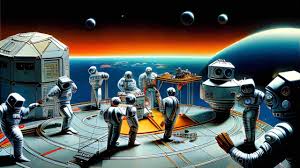Space engineering is a multidisciplinary field that combines elements of aerospace engineering, mechanical engineering, electrical engineering, and other disciplines to design, develop, and operate spacecraft and space systems. It is a rapidly growing field that plays a crucial role in enabling human exploration of the cosmos.
Key Areas of Space Engineering
- Propulsion: Space engineers design and develop propulsion systems that enable spacecraft to launch into orbit and travel to distant destinations. This includes chemical rockets, electric propulsion systems, and solar sails.
- Structures: Spacecraft structures must be lightweight, durable, and able to withstand the harsh conditions of space, including extreme temperatures, radiation, and microgravity. Space engineers design and test spacecraft structures to ensure their safety and reliability.
- Avionics: Avionics systems control the operation of spacecraft, including guidance, navigation, and communication. Space engineers design and develop these systems to ensure that spacecraft can function autonomously in space.
- Life Support Systems: For manned spaceflight, life support systems are essential to provide astronauts with the necessary oxygen, water, food, and waste management. Space engineers design and develop these systems to ensure the survival of astronauts in space.
- Robotics: Robotic spacecraft and rovers are used to explore distant planets and moons. Space engineers design and develop these robots, as well as the software and algorithms that control them.
Challenges and Opportunities
Space engineering is a challenging field that requires a high degree of technical expertise and problem-solving skills. However, it also offers exciting opportunities for innovation and discovery. Some of the key challenges and opportunities in space engineering include:
- Miniaturization: Spacecraft must be as small and lightweight as possible to reduce launch costs. This requires the development of miniaturized electronics and components.
- Reliability: Spacecraft must be highly reliable, as there is often no way to repair them once they are in orbit. This requires rigorous testing and quality control.
- Sustainability: Space exploration must be sustainable in order to ensure that it can continue into the future. This requires developing technologies that minimize environmental impact and reduce the cost of spaceflight.
- International Cooperation: Space exploration is a complex and expensive endeavor that often requires international cooperation. Space engineers must work together with colleagues from around the world to achieve common goals.
Space engineering is a rapidly evolving field with the potential to revolutionize our understanding of the universe and our place within it. As we continue to explore the cosmos, the skills and expertise of space engineers will be essential for achieving our goals.
